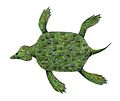Trematospondylus
| Trematospondylus Temporal range: Middle Jurassic,
| |
|---|---|
| Scientific classification | |
| Domain: | Eukaryota |
| Kingdom: | Animalia |
| Phylum: | Chordata |
| Class: | Reptilia |
| Superorder: | †Sauropterygia |
| Order: | †Plesiosauria |
| Family: | †Rhomaleosauridae |
| Genus: | †Trematospondylus Quenstedt, 1858 |
| Species | |
Trematospondylus ("hole spinner"[1]) is a dubious genus of plesiosaurs from the Middle Jurassic of Baden-Württemberg, Germany. The only named species is Trematospondylus macrocephalus. It is one of the earliest scientifically described plesiosaurs and historically has been the first plesiosaur named from Germany.[1] Preserved remains include seven vertebrae.
Research history
[edit]T. macrocephalus was first named by Quenstedt in 1858, who found the fossils in the layers of the Dentalienton Formation at Lochen mountain massif in the Zollernalbkreis of Baden-Württemberg.[2] Its species name likely derives from the Macrocephalus oolite that had been deposited directly above the fossils and is named after the ammonite Macrocephalites macrocephalus.[1] The genus name refers to a small opening at the articulation surface of the vertebrae.
Initially, Quenstedt was uncertain about the interrelationships of Trematospondylus and compared it to fishes, dinosaurs and cetiosaurs[2] (the latter had been considered to represent marine reptiles back then [3]). In 1861, he called it a plesiosaur and suggested affinities with Thaumatosaurus.[4]
Trematospondylus had been mentioned in a few additional works [5][6][7] but disappeared from the scientific literature until it got redescribed by Sven Sachs and colleagues in 2023.[1] The latter consider Trematospondylus macrocephalus a nomen dubium but also suggest affinities with rhomaleosaurids.
Description
[edit]T. macrocephalus is known by seven large vertebrae, among them two caudals and a possible sacral vertebra. The other bones might represent caudals as well. They likely belonged to a mature individual that was similar to Rhomaleosaurus in size.[1]
Phylogeny
[edit]Sachs et al. (2023) performed several phylogenetic analyses that nested Trematospondylus within Rhomaleosauridae.
| Rhomaleosauridae | |
References
[edit]- ^ a b c d e Sachs, S., Abel, P. und Madzia, D. (2023) A ‘long-forgotten’ plesiosaur provides evidence of large-bodied rhomaleosaurids in the Middle Jurassic of Germany, Journal of Vertebrate Paleontology 42(5). doi:10.1080/02724634.2023.2205456.
- ^ a b Quenstedt, F. A. (1858). Der Jura. Laupp’schen Buchhandlung. p. 466–467. [1].
- ^ Owen, R. (1842). Report on British fossil reptiles, Part II. Reports of the British Association for the Advancement of Science 11, 60–204. [2]
- ^ Quenstedt, F. A. (1861). Epochen der Natur. Laupp’schen Buchhandlung.
- ^ Quenstedt, F. A. (1865). Handbuch der Petrefaktenkunde. Laupp’schen Buchhandlung.
- ^ Quenstedt, F. A. (1885). Handbuch der Petrefaktenkunde. Dritte und vermehrte Ausgabe. Laupp’schen Buchhandlung.
- ^ Engel, T. (1883). Geognostischer Wegweiser durch Württemberg. Stuttgart: E. Schweizerbart’sche Verlagshandlung.[3]







